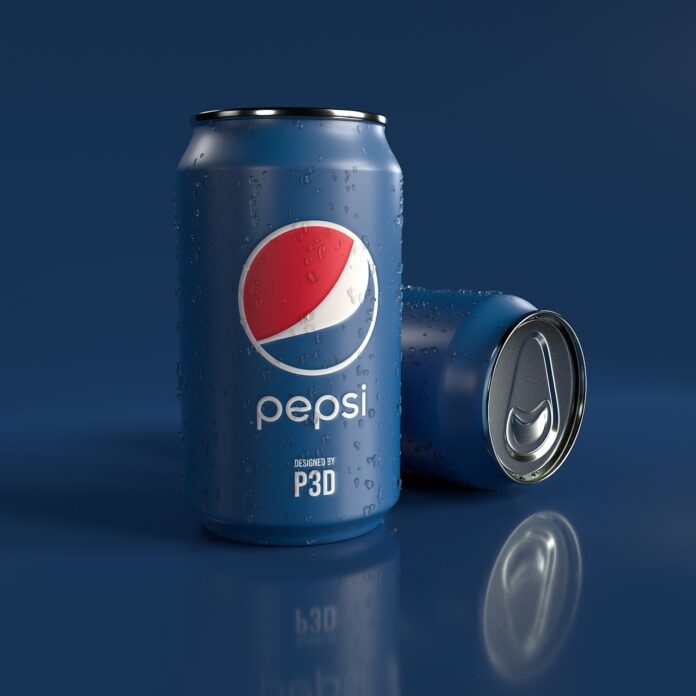PepsiCo, Inc. owns the Pepsi brand, along with other well-known products like Mountain Dew, Gatorade, Tropicana, and Quaker Oats. PepsiCo was formed in 1965 after the merger of the Pepsi-Cola Company and Frito-Lay, creating one of the largest food and beverage corporations in the world. The company is publicly traded, so it’s owned by shareholders.
In terms of revenue, PepsiCo is a giant in the beverage and snack industry. As of 2023, the company generated more than $86 billion in revenue. Although Pepsi itself is one of their flagship brands, PepsiCo’s business model includes a diverse portfolio of food and beverage products, making it a global powerhouse in consumer goods.
Market Position
Pepsi ranks as one of the top two soft drink brands globally, in constant competition with Coca-Cola. While Coca-Cola has traditionally held the top spot in terms of market share, Pepsi has consistently maintained the second position in the soda market. However, in the broader food and beverage sector, PepsiCo often outperforms Coca-Cola due to its diversified products, including snacks and non-carbonated beverages.
Interesting Facts
- Pepsi Was Originally Called “Brad’s Drink”: In 1893, Caleb Bradham, a pharmacist from North Carolina, created what would eventually become Pepsi. He initially named the drink “Brad’s Drink”, and it wasn’t until 1898 that he rebranded it as Pepsi-Cola.
- Pepsi’s Early Bankruptcy: Pepsi faced financial troubles early in its history and went bankrupt twice during the Great Depression in the 1930s. Coca-Cola even passed on the chance to buy the struggling brand. However, Pepsi managed to recover and became a global icon.
- Pepsi’s Role in the Cola Wars: Pepsi’s rivalry with Coca-Cola is legendary. The “Cola Wars” heated up in the 1980s, with aggressive advertising and product differentiation. Pepsi launched the Pepsi Challenge, a blind taste test where consumers often preferred Pepsi’s sweeter flavor over Coca-Cola’s. This campaign helped Pepsi gain ground in the competitive soda market.
- Pepsi’s Space Ambition: Pepsi made history by being the first soda brand to try advertising in space. In 1996, they launched a giant Pepsi logo in orbit during a Russian space mission, which was seen as a groundbreaking moment for space marketing. While the stunt grabbed headlines, it didn’t quite create the splash they had hoped for.
- Pepsi’s Connection with Pop Culture: Pepsi has had some of the most iconic advertising campaigns, featuring superstars like Michael Jackson, Britney Spears, and Beyoncé. In 1984, Michael Jackson’s hair caught fire during the filming of a Pepsi commercial, which became a highly publicized incident. The incident led to his hospitalization and subsequent plastic surgery.
- Pepsi and Crystal Pepsi: In the early 1990s, Pepsi introduced Crystal Pepsi, a clear version of the cola that was marketed as a caffeine-free alternative. Despite initial interest, the product was discontinued after poor sales, though it has since achieved cult status and made a brief comeback in 2016.
- Global Reach: Pepsi is sold in over 200 countries, making it one of the most recognized and consumed beverages in the world. It’s especially popular in countries like India, where it often outpaces Coca-Cola in market share due to localized marketing and flavor offerings.
- Michael Jackson’s Pepsi Accident (1984): One of the most infamous incidents involving Pepsi occurred in 1984 when Michael Jackson’s hair caught fire while filming a Pepsi commercial. The accident was caused by a pyrotechnics malfunction. Jackson suffered second and third-degree burns and later underwent plastic surgery. Pepsi settled with Jackson out of court, and the incident marked a turning point in the pop star’s life, including his increased use of pain medication.
- Pepsi Number Fever Scandal (1992): In 1992, Pepsi ran a promotional campaign in the Philippines called “Pepsi Number Fever,” where consumers could win cash prizes by collecting bottle caps with specific numbers. Unfortunately, a technical glitch led to 800,000 bottle caps showing the winning number 349, leading to mass protests and lawsuits when the company refused to pay out. This led to riots and several deaths, one of the most notorious promotional failures in Pepsi’s history.
- Pepsi’s Kendall Jenner Controversy (2017): In 2017, Pepsi launched a commercial featuring model Kendall Jenner that attempted to align the brand with the Black Lives Matter movement and social justice causes. The ad showed Jenner handing a can of Pepsi to a police officer during a protest, implying that Pepsi could bring peace between activists and law enforcement. The ad was widely criticized for being tone-deaf and trivializing serious issues. Pepsi quickly pulled the commercial and issued an apology.
- Syringe Hoax Scandal (1993): In 1993, Pepsi faced a public relations nightmare when consumers reported finding syringes in cans of Diet Pepsi across multiple states in the U.S. The company maintained that it was a hoax, and after investigations, it was proven that most claims were fabricated. Pepsi even created a video showing the impossibility of inserting objects into sealed cans to restore public trust.
